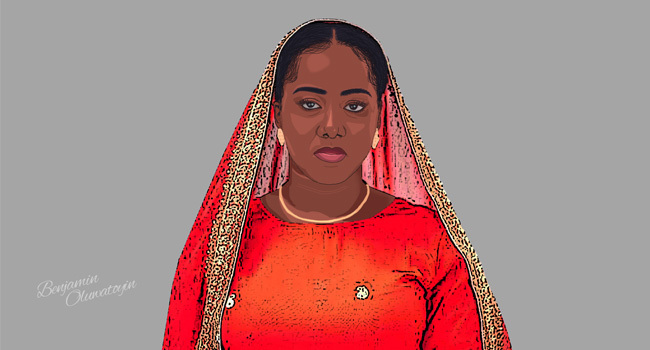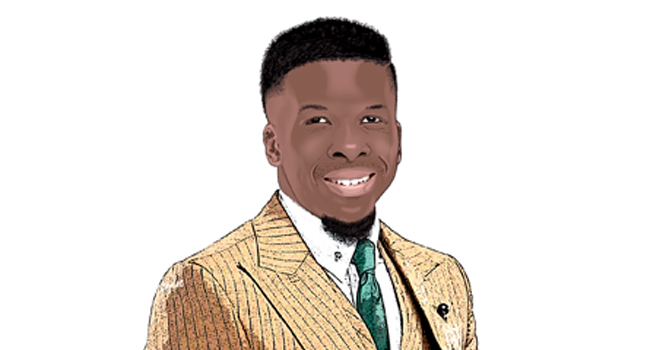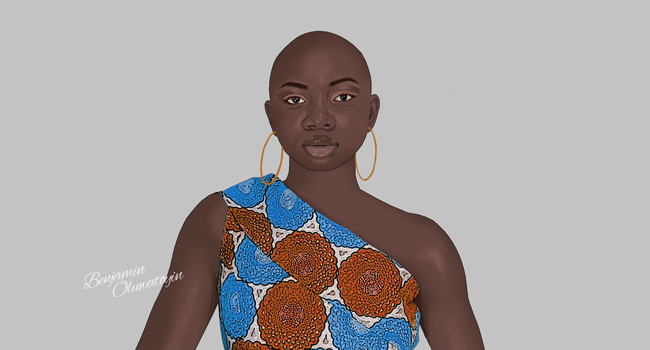
My first interaction with Hassana’s work was via an Instagram Live series she started during the Covid lockdown, about sexual violence. She’s carried out similar activities throughout her adult life, campaigning for causes she feels to be right. Hassana, a law graduate of the Ahmadu Bello University, is perhaps more well-known for her work with Arewa Me Too and North Normal, two social-media driven movements that sought to change the narrative of sexual violence in Northern Nigeria. It’s still early days in this generational struggle against dark trends like child marriage and rape, but Hassana is confident change is on the horizon.
First Class is a column about extraordinary Nigerians aged 35 years and below. It collects their thoughts on what it takes to thrive as a young person in Nigeria.
Do you know someone who fits the bill? Recommend a name here.
Sign up to receive the latest installment of exclusive First Class interviews in your email.
SE: Tell me about yourself? What was growing up like?
HM: I’m going to start with a funny story. Growing up, I loved reading. So, I always had my nose buried in a book. And every typical African mother believes her daughter should be in the kitchen learning how to cook. And each time I’m in the kitchen, I would have my face buried in a book. And one time, my mum asked me to take care of a meal and make sure it doesn’t burn while she goes to do something else. And I was with my book, reading, and my mum came back into the kitchen and the next thing I felt was a slap. Apparently, the food was burning but my mind was far away. So, that was like a big issue. And it wasn’t like she was opposed to me reading, but I just did not feel there was a time or place to read. I used to read everywhere, while eating, in the toilet. And that’s one reason why I’m surprised when people display well-kept books because it just can never be me.
That was how growing up was for me. I’m the only girl, I have two brothers. I have an elder and a younger one. Then my dad and mom. So we were just like a very close-knit family. My dad used to travel a lot, but at the same time, I just never felt like he wasn’t there, because he was very involved in my academics. Even when he wasn’t there, I just had it at the back of my mind that daddy would come back and I’ll tell him whatever I wanted to say. Growing up for me was my dad reading a newspaper and finding something interesting, putting an asterisk on it, and telling me to read it. It’s my dad buying a book from a bus park when he travels and asking me to read and summarise during the holidays. Growing up was fun. It was my mum cooking and baking because she loves to bake and cook. Growing up was my mum insisting on what women should wear and do and be. We used to have a lot of debates at home. I was a fierce advocate. I used to advocate for myself even before I started advocating for other people.
Is it correct to say your upbringing influenced your journey into gender advocacy?
Yes, but not from a place of disadvantage or oppression. It is from a place of me going out into the world and seeing things that should not happen. My brothers today say they don’t understand why I’m a feminist because they believe I grew up in a very feminist home. I used to fiercely advocate for gender roles. I would insist everyone must wash their plates. So, I did not grow up to be a feminist because of what I experienced. Of course there were some gender roles that I used to oppose. My mum would say there are no gender roles in our house, but of course that’s not true because I think I have done much more housework than my brothers.
Where did you grow up?
We lived in Borno but for my secondary school education, I went to Queens College in Lagos. And you know how Queen’s College girls are. I never used to think of myself as less. And we had the King’s College students who we used to interact with. We felt like we complemented one another. And even with WAEC results, it was never a thing of feeling intellectually inferior.
Can you talk about North Normal? What were you trying to achieve?
It was Arewa Me Too that gave birth to North Normal. I was on Twitter and I saw Khadija’s story, which was really sad, about how she was assaulted by her boyfriend. And people wanted her to shut up, because how can an Arewa girl be talking about being assaulted by her boyfriend. They wanted her to admit that it’s even wrong to have a boyfriend, which is hypocritical in this century. But it’s just also tactics that people use to shut women down. I was impressed that many people rallied around her and other women started sharing their stories.
People believe that if you don’t talk about something, then it disappears, but that is not true. It just becomes so common that it becomes normalised. If you are not speaking about or against it, then it means you are giving it permission to continue. And that is it with sexual violence in Northern Nigeria. So, for me, we can’t let that continue. And I remember tweeting a call for people in Borno who want to go to school, to churches, to streets, to the mosques, to spread awareness about this issue. I got an overwhelming response. And then we had a meeting. And we started going to schools and talking to children, their teachers, going to communities, speaking to people about sexual violence, telling them that it’s not okay to keep quiet.
Then we realised that there were lots of problems, because where are we starting from? When you talk to children to report to the police and the police laugh at them to leave the station. Or when you speak to lawyers and they say how do you want us to prosecute this, have you seen the laws on sexual violence? So North Normal came out of a necessity to do something with a structure, because Arewa Me Too did not have one. So we need to have a project and implement that project. For us, it was trying to see how we can get the Violence Against Persons Prohibition Act domesticated. Because it’s a great piece of legislation that talks about every facet of sexual violence. And it wasn’t gendered. Also, when you go to school and talk to people, you see boys say they also get assaulted.
So, North Normal was born out of necessity. We had meetings across eight northern states. Fakhriya Hashim, who started the North Normal campaign, called me and asked me – seeing the success I had been able to record with the Arewa Me Too campaign – to lead the campaign. The intention was also to see how we could go to the State Houses of Assembly to do the campaign. We were able to do that in some states, but it was very difficult in others. In Sokoto for instance, a night before the campaign, we were accused of trying to push for same-sex marriage, just to invalidate the movement. I remember Sadiya Tahir, who was the Sokoto lead, was assaulted by the police. I remembered feeling so helpless at that point. In Borno, we also had our own issues. We had the issue of the police approving the rally and later on saying no, we can’t, just a night before the rally. But there was a kind legislator, Hon Aji Kolo, that said we should come do it inside the State House of Assembly. And even before then, we had a series of meetings with the Borno State House of Assembly members. So, fairly, it was a success. But not without its challenges. In Niger State, we had Hauwa Shafi’i, who was supposed to just take a letter to the police to ask for permission, and the policeman told her to follow him to a hotel. So, you are trying to do a rally against sexual violence, and here’s a man proposing sex, because she brought a letter.
Now, I think Sokoto has domesticated the VAPP act. Bauchi and Borno have done so. Those are successes. Although, I haven’t seen the version Borno has domesticated, because it’s been very difficult to get a hold of it.
Sometimes, do you feel a sense of despair when you think about ending sexual violence?
Yes, I feel a whole lot of despair. But it’s not something that exists in a vacuum. I know that it exists out of somewhere, and it’s because of the power imbalance that we have in the world. For us to completely eradicate sexual violence, you have to work on that power imbalance. You have to start looking at gender-power imbalance, things like how much power employers have over employees, how much power parents have over children, uncles have over nieces. So we must interrogate power and our relationship with power. And that’s something that must be taught to every child as they grow up. That’s why when we say empower people, it’s not just giving them a sachet of milo or sewing machines, it’s also about the mind. We must raise individuals that are truly empowered. And being empowered is also taking agency of yourself. And that’s one thing we don’t teach young people enough. For example, when girls say they can do certain things, the common answer is ‘wait till you get to your husband’s house.’ That’s teaching girls that her body is not hers to make certain decisions. We must interrogate power in all its forms. And you can only do that by putting proper policies and laws in place; policies and laws that are also open to feedback.
I wanted you to talk about some of the backlash your work has received . . .
Oh yes, they bullied us on social media. They said we are lesbians. And that was supposed to pass a message that we are not fully Arewa. And that by our sexuality – which is ridiculous – no one should listen to us because we were not one of them. Because what made Arewa Me Too powerful was because it wasn’t saviours from the south or the west coming to save Arewa girls from sexual violence. It was us, someone from Borno, Jigawa, Sokoto. We were as native as native could be. If you want to take the special place we hold in society, all you have to do is look for something the society abhors and say these people are that thing. So that way, people that listen to us or tend to agree with us reject our ideas.
Tell me some of the mistakes you’ve made in your career?
I think my career is just starting and I can’t say I have made certain life-altering mistakes. For me I wish we had made Arewa Me Too more structured from the start. Because that way there would be so many people that won’t fall through the cracks. And I believe that has happened, because we didn’t structure it. But we also didn’t want to structure because we wanted it to be as decentralised as possible. That comes with its cost.
Does North Normal still exists?
Yes, it does. We are still trying to restructure. The aim is to see the VAPP act domesticated and implemented. Right now, it’s getting domesticated across the board, but is it getting implemented? That’s something we need to work on.
Do you ever think of leaving Nigeria permanently?
Mba! No, I don’t think of leaving Nigeria permanently. I don’t even think of leaving for like a long stretch, because home will always be home. I strongly believe that my purpose is in Nigeria, in Northern Nigeria. I feel like there’s so much that needs to be done. And the so much that needs to be done is built for such a moment as this. I’m part of this society and, to some extent, things work. I know it’s also very idealistic, coming back to Nigeria from abroad, but I feel we can build stuff and change things. And I understand how frustrating Nigeria can be – you are fixing one thing and ten other things are getting broken. But I believe we can do it. I believe we can’t all migrate from Nigeria. I believe even the idea of migration is very elitist. We are leaving so many people behind. People that cannot otherwise migrate. Who are we leaving Nigeria for? Omo, we die here oh.
How do you think young people can make Nigeria a better country?
By getting involved. It doesn’t matter how or where. You know this thing they tell women, that if you don’t give you a seat at the table, bring your own chair – that’s what I would tell young people. I also understand the idea of age where you feel you are too young to be involved. No, you are not. In Hausa, we say a dama da kai, they should do it with you. Because we can complain all we want, but we cannot all migrate, it’s not realistic. And I think it was the poet Titilope Sonuga who said rock bottom is the perfect place for rebuilding. So this rock bottom we are getting in, that’s the perfect place to rebuild.
Who would you recommend as a First Class Nigerian?
Hauwa Shafi’i Nuhu. She’s with Humangle. She does interesting reporting about terorrism in Northern Nigeria. She does fantastic work. She was also part of North Normal. She’s changing the world with her writing.
First Class is a column about extraordinary Nigerians aged 35 years and below. It collects their thoughts on what it takes to thrive as a young person in Nigeria.
Do you know someone who fits the bill? Recommend a name here.
Sign up to receive the latest installment of exclusive First Class interviews in your email.




